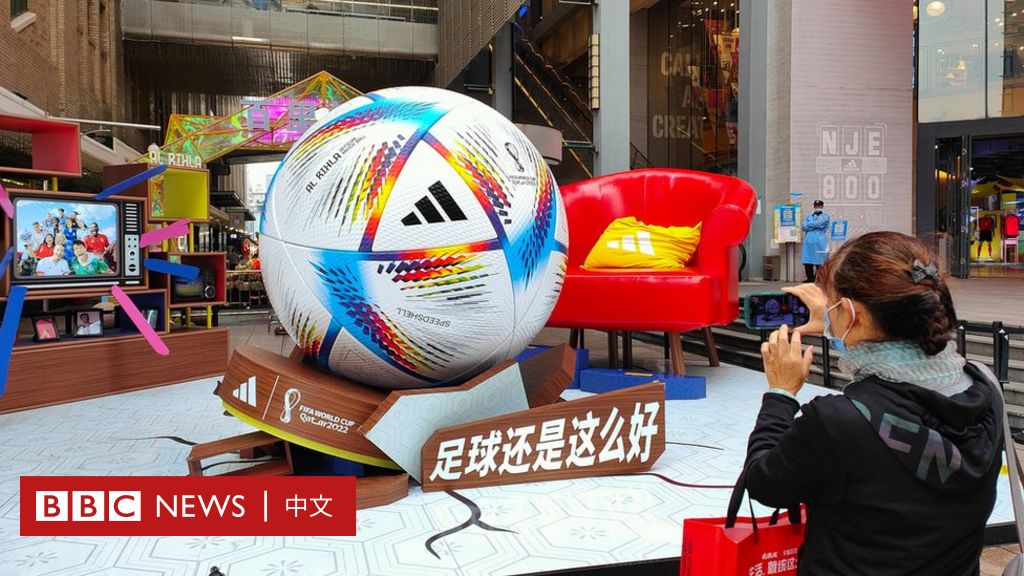image source,Getty Images
Chinese President Xi Jinping is believed to be a fan.
The 2022 World Cup in Qatar is in its fourth day, as always the Chinese media and social networks have devoted great attention to this competition, it is like living in a “parallel universe”.
The Chinese men’s soccer team did not qualify for the World Cup finals, but the Chinese public paid close attention to the matches in Qatar through television and the Internet.
The scenes of World Cup fans enjoying the match and celebrating victory in Qatar without masks and anti-epidemic checks have made some Chinese netizens even more dissatisfied with the continued lockdown in their country.
On the other hand, teams from Saudi Arabia and Japan, the two teams that swept the Chinese team in the Asian qualifiers for World Cup qualification, achieved success in this week’s competition, defeating traditional powerhouses Argentina and Germany, and I am also enthusiastic about the Chinese Internet, lamenting the stagnation of the Chinese men’s soccer team.
Chinese elements of the World Cup
China has not entered the World Cup finals in the past 20 years, but China has a huge fan market and a leader who has always been regarded as a fan.
The CCTV official media is the live broadcaster of the World Cup in mainland China, and the major official media also hopes to maximize China’s “attendance” at the World Cup.
The “Global Times” published an editorial on the opening day of the World Cup, exalting the “Chinese elements” of the World Cup in Qatar: from the Lusail Stadium, the latest venue built by Chinese companies, to the new energy buses, to the gift of China in Qatar ahead of World Cup Giant pandas ‘Jingjing’ and ‘Sihai’ from the Chinese Academy of Sciences said these items ‘convey Chinese people’s best wishes for the World Cup’.
On the pitch, as at the World Cup in Russia four years ago, Chinese advertisements of Chinese companies often appeared on pitchside billboards.
image source,Getty Images
China gave giant pandas to Qatar for the World Cup.
Epidemic Lockdown – “Isn’t It a Planet?”
However, during the World Cup, China experienced its worst outbreak of the new crown in six months: the number of new infections in a single day announced on Thursday passed the 31,000 mark. Non-essential shops have been suspended in many areas and residents have been asked to limit their activities.
The number of flights between Qatar and China has been significantly reduced, which has reduced the number of Chinese people who have traveled to the venue to watch the match in person. In China, many provinces and cities are also in a state of business limited. According to Chinese media reports, “90% of people will choose to watch football at home.”
image source,Getty Images
During the World Cup, a bar in Shanghai had almost no customers.
China’s “dynamic clearing” policy continues and coincides with the World Cup. Chinese netizens cannot fail to notice the contrast between the country’s tight control and the Qatari stadium carnival.
An open letter titled “Ten Questions” was released on China’s WeChat platform on Tuesday, raising ten questions about Chinese authorities’ new corona epidemic prevention policies, including the World Cup in Qatar.
“The World Cup in Qatar is about to start. The fans didn’t see anyone wearing a mask and didn’t feel they needed to see a nucleic acid test certificate. Don’t they live on the same planet as us?”
The item was blocked after only circulating for a short time.
On Sina Weibo, netizens also talked about the contrast between China and the World Cup in the early days of the World Cup.
“The crowd in the stands and outside the stadium is so cute… Before, I only envied the World Cup players, but now I envy the spectators sitting in the stands!” said a Weibo post.
Another comment said, “The World Cup is very popular. I suddenly saw the news of Xinjiang, Zhengzhou and Chongqing. The news of the outbreak of the epidemic in various regions and the extension of the lockdown period.
Most posts criticizing or complaining that China and the rest of the world are dealing with the current COVID-19 pandemic differently are not blocked on Weibo, but there are also netizens who are still critical of the massive easing of other countries’ restrictions while the global epidemic is not over, he expressed disapproval.
At present, there is no clear sign of easing of China’s “dynamic reset” policy. The latest notice issued by the National Health and Medical Commission of China in November still points out that “the prevention and control situation is still serious and complicated, and we must maintain a strategic focus and do a good job in epidemic prevention and control in scientific and precise way.”
China was originally the host country for the 2023 Asian Cup soccer match, but because it refused to promise the Asian Football Confederation (AFC) that it would allow fans to watch the match on site, China withdrew the right to host it, and will be hosted by Qatar, which at the time already hosted the World Cup.
To welcome the World Cup, Qatar has lifted travel restrictions related to the new corona outbreak from November 1, and no longer requires nucleic acid testing or vaccine certification, and no need to wear masks while playing.
“Light of Asia” throws off Chinese football
image source,Getty Images
Japan beat Germany in the first round of the group stage
So far the Asian teams are doing well in this World Cup. Although Qatar and Iran lost to obviously stronger opponents in the first two days, Saudi Arabia and Japan “surprised” two-time World Cup champion Argentina and four-time champion Germany respectively on Tuesday and Wednesday, shocking the world .
This is the first time in the history of the World Cup that two traditionally strong teams have lost against an Asian team, therefore the Saudi and Japanese teams have been dubbed the “Light of Asia” on the Chinese Internet.
The Saudi and Japanese teams were in the same group as the Chinese team in the previous Asian World Cup qualifiers. The Chinese team failed to qualify. Many netizens lamented the gap between Chinese football and the top Asian teams.
In particular, the Japanese team’s victory over Germany sparked widespread discussion on Weibo. The hashtag “#GermanyvsJapan” was viewed 1.38 billion times in the 24 hours following the match on Weibo.
“We are all celebrating Japan’s victory over Germany, but we, who started together in the beginning, are now gone, so I must be feeling a little sad,” said a Weibo post.
“I hate Japan, but the power emanating from this small country scares me,” said another.
The Japanese team entered the World Cup finals for the first time in 1998, one season ahead of the Chinese team. However, since then Japan has entered the World Cup seven consecutive times, while the Chinese team has only entered it once in 2002.
After the game, Japanese fans celebrated the victory in Qatar and did not forget to clean up the trash, which was praised around the world. Chinese netizens also praised the Japanese football culture style and national quality.
“Is it hard to admit that there is a gap? Yes, it is hard… this is the reality!” said one post.
World Cup and human rights
image source,Getty Images
Iranian players did not sing the national anthem before the game
The human rights situation in Qatar is one of the off-pitch topics that have attracted a lot of attention in this World Cup. The performance of Asian teams on this issue has also been discussed by Chinese netizens.
Ahead of Iran’s match against England, Iranian players collectively refused to sing along when their national anthem was played, protesting the Iranian government’s oppression of women and the crackdown on youth rallies. human rights in the country.
The England team had planned ahead of the match that the captain would wear an armband with the words ‘One Love’ and a rainbow motif on the pitch to support anti-discrimination and advocacy for diversity, but the FIFA banned it according to England, like many other European captains, canceled the plan after voicing it and warning the captain he could be booked for it.
But the England team still protested by going down on one knee before the match.
In the end, the Iranian team lost 2-6, but the attitude of the players caused discussions on the Chinese Internet. The hashtag “#Iran team started without singing the national anthem” was read 430 million times on Sina Weibo.
Some netizens have expressed their appreciation for the female voice of Iranian players, calling them “real men”.
“Iranian players only lost one game, but they earned the respect of the whole world,” said a Weibo post.
On the WeChat platform, an article titled “Twenty Two Are Men” has more than 100,000 views. The article praised the behavior of England and Iran players “beyond football, beyond borders”.
A comment below the article read: “Twenty-two are people.”
“Some people may give up their lives for freedom, and some people may give up everything for life,” said another comment.
However, some netizens have pointed out that protesting for human rights during the World Cup confuses politics and sports and is a “double standard” for Western audiences.
The Qatar World Cup is regarded by the outside world as the most “political” World Cup in history. FIFA President Giovanni Infantino (Infantino) once criticized the West’s criticism of this World Cup.
“I think for what we Europeans have done in the last 3,000 years, we should apologize for the next 3,000 years and then moralise others,” Infantino told media ahead of the World Cup.


